Mazi Mas: The life-changing restaurant staffed by migrant and refugee women
Kashmira Gander talks to the women behind a Hackney restaurant offering not only employment but a creative outlet
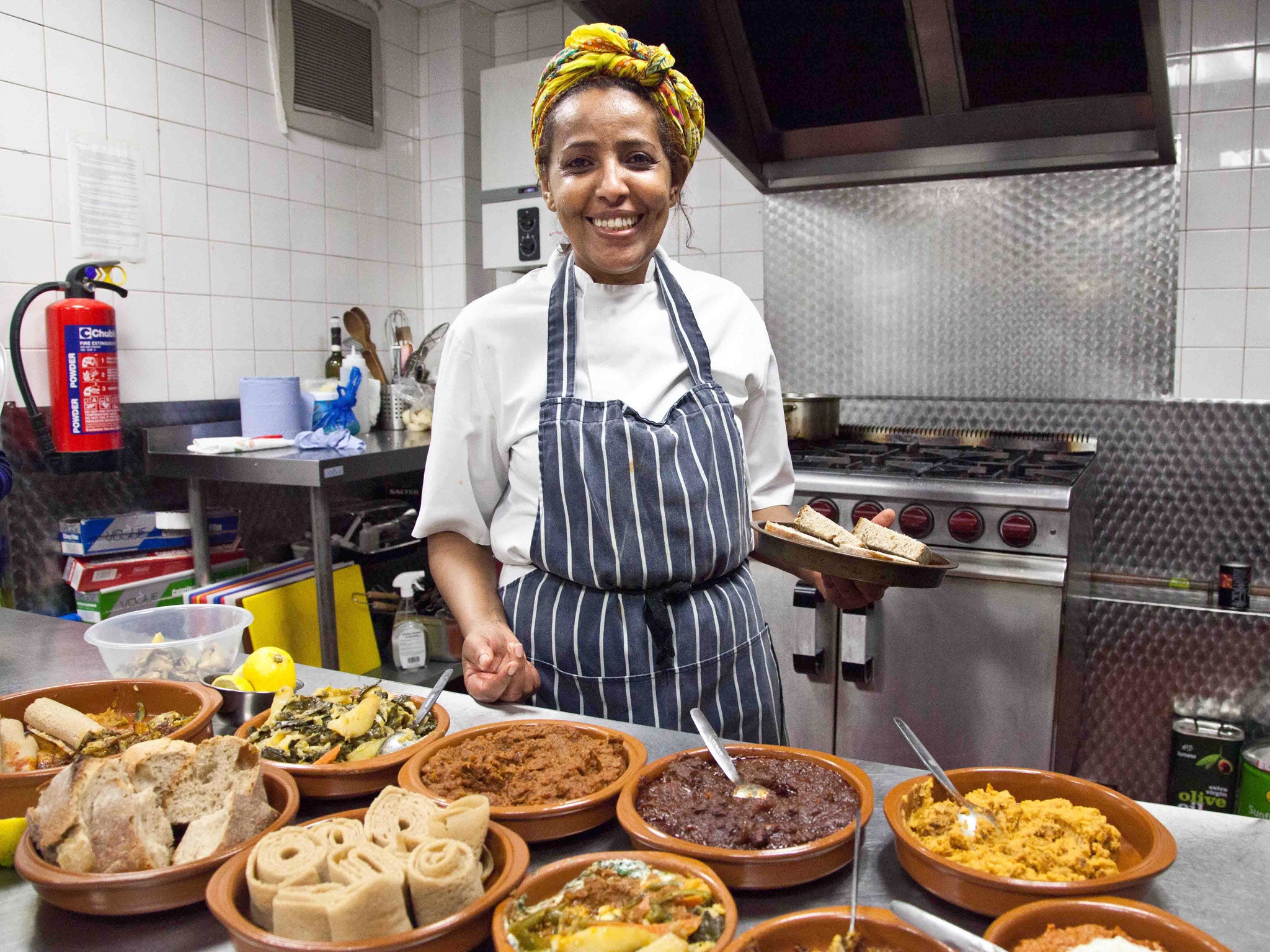
Your support helps us to tell the story
From reproductive rights to climate change to Big Tech, The Independent is on the ground when the story is developing. Whether it's investigating the financials of Elon Musk's pro-Trump PAC or producing our latest documentary, 'The A Word', which shines a light on the American women fighting for reproductive rights, we know how important it is to parse out the facts from the messaging.
At such a critical moment in US history, we need reporters on the ground. Your donation allows us to keep sending journalists to speak to both sides of the story.
The Independent is trusted by Americans across the entire political spectrum. And unlike many other quality news outlets, we choose not to lock Americans out of our reporting and analysis with paywalls. We believe quality journalism should be available to everyone, paid for by those who can afford it.
Your support makes all the difference.Vibrant Indian curries and spicy Portuguese Perri Perri chicken are among the UK’s favourite dishes: if this proves anything it’s that food is a unifying force.
And in a political climate where demagogues are pledging to separate countries with gigantic walls it is clear that we are desperately in need of food’s power.
So, it’s lucky that Nikandre Kopcke, a half-Greek and half-German New Yorker, got about setting up a restaurant staffed entirely by refugee and migrant women back in 2012.
Mazi Mas’ current staff consists of female chefs from Iran, Ethiopia, Turkey, Senegal, Peru, Nicaragua, Turkey, Brazil and Nepal, who approached Kopcke or were recruited from migrant and refugee outreach programmes in London.

A year since the roaming restaurant took up residence at The Russett in Hackney, east London, the women are reflecting on their achievements, and steaming ahead with plans to develop formal training programmes; attempt to recruit newly-arrived Syrian women; and support new Mazi Mas kitchens for asylum seekers springing up in Australia.
In this time, the restaurant has become mechanism both for tackling prejudice and helping women find a place in mainstream society.
Those entering a new country struggle in many ways, particularly if they lack language skills and experience a loss of status, explains Dr Jason Hart, Department of Social & Policy Sciences at the University of Bath.
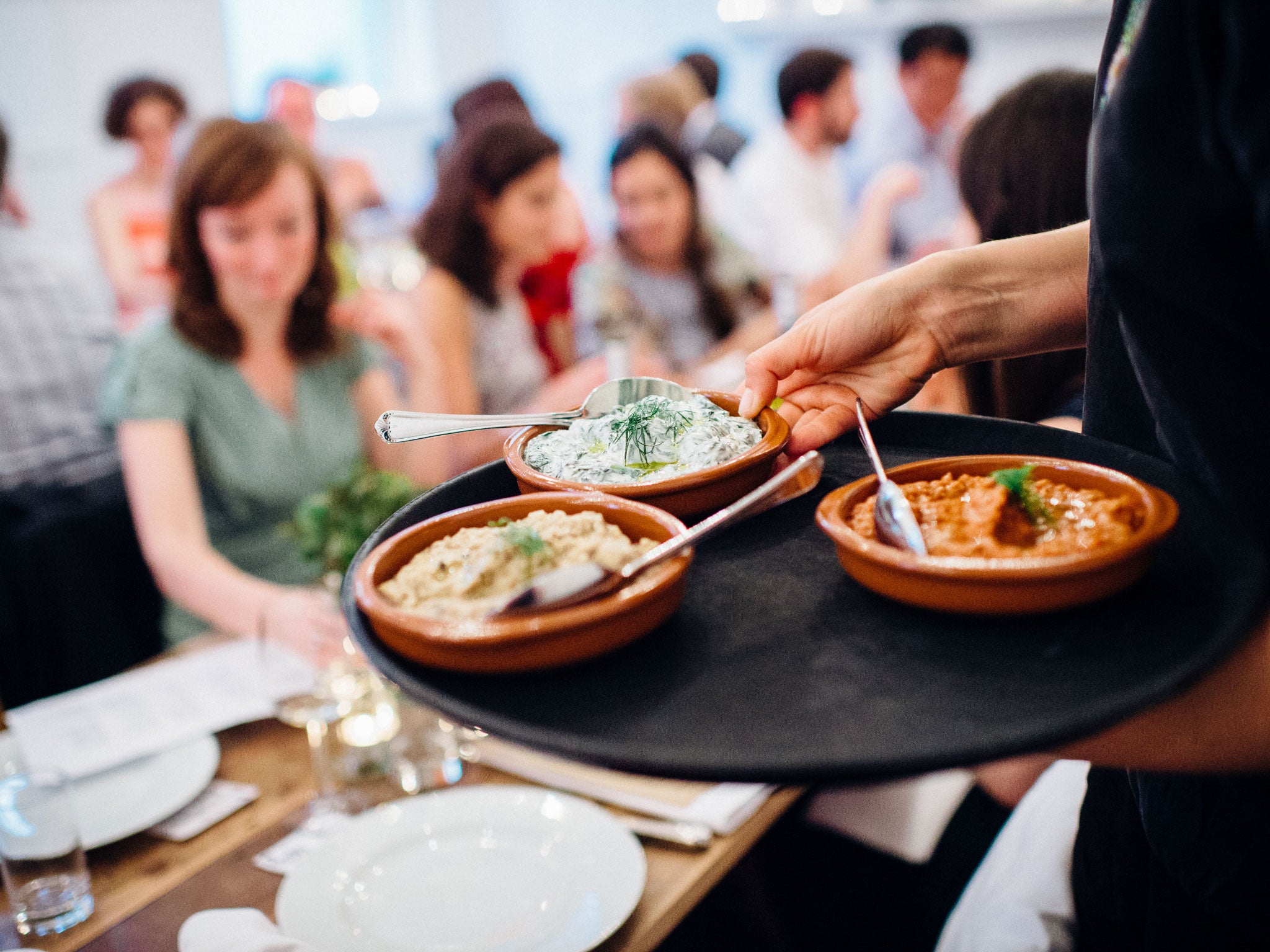
“In your new home you experience humiliation at being treated as one of a mass of ‘refugees’, denied meaningful employment and the regard of those around you.”
But food is part of the solution, believes Kopcke. “If you're having dinner with someone or eating their food it’s much more difficult to fear them,” she says.
The restaurant is also a creative outlet. By suggesting dishes from their countries of origin and teaching each other to cook them, the women piece together eclectic seasonal menus.
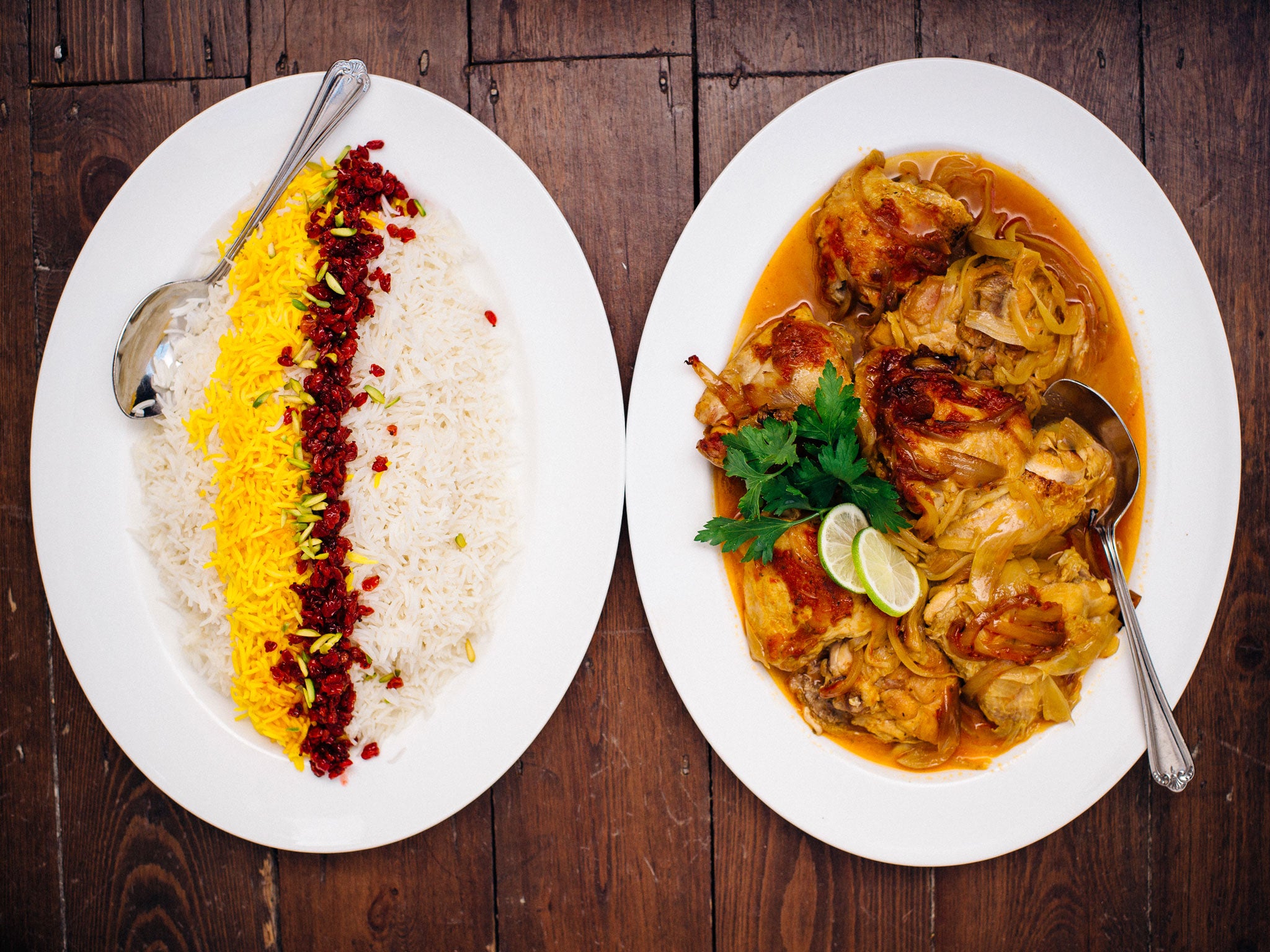
Pan-fried fish marinated in cinnamon and tamarind-herb sauce served with saffron rice from Iran and salad plate featuring Ethiopian, Nepalese and Peruvian dishes are among the delights on the new Spring menu.
Maria Marouli, Kopcke’s Greek Godmother, was the inspiration for Mazi Mas, which means “eat with us” in Greek.
An exceptional cook, Marouli’s husband smashed her dream of opening up a bakery - her job was to look after their children.
Volunteering in community kitchens and migrant centres in London, Kopcke saw her Godmother’s story mirrored in the lives of the women she met. Prospective employers repeatedly rejected them for apparently having no skills.
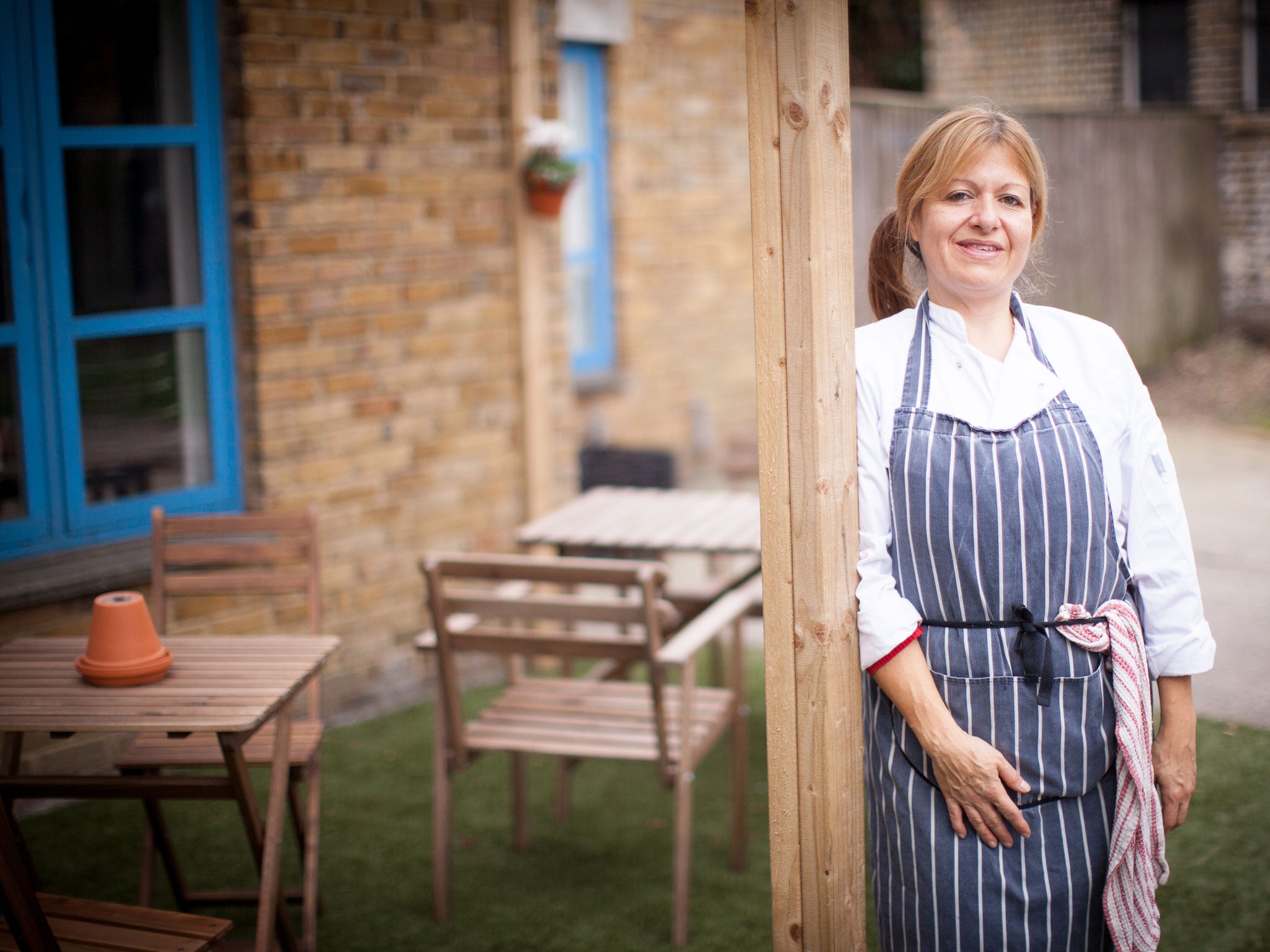
A sociology and gender studies graduate, Kopcke soon decided “it was time for me to stop talking feminism, and start doing it.”
Marlith Tenazoa Del Aguila from Rioja, Peru, is part of the Mazi Mas team. She came to London in search of new horizons and to join her daughter. She says she loves cooking because it “comes from the heart” and “unites people”. To Del Aguila, Mazi Mas is a “humanitarian organisation.”
“Mazi Mas, regardless of race, creed or age, gives women the opportunity to better themselves,” says the 59-year-old.
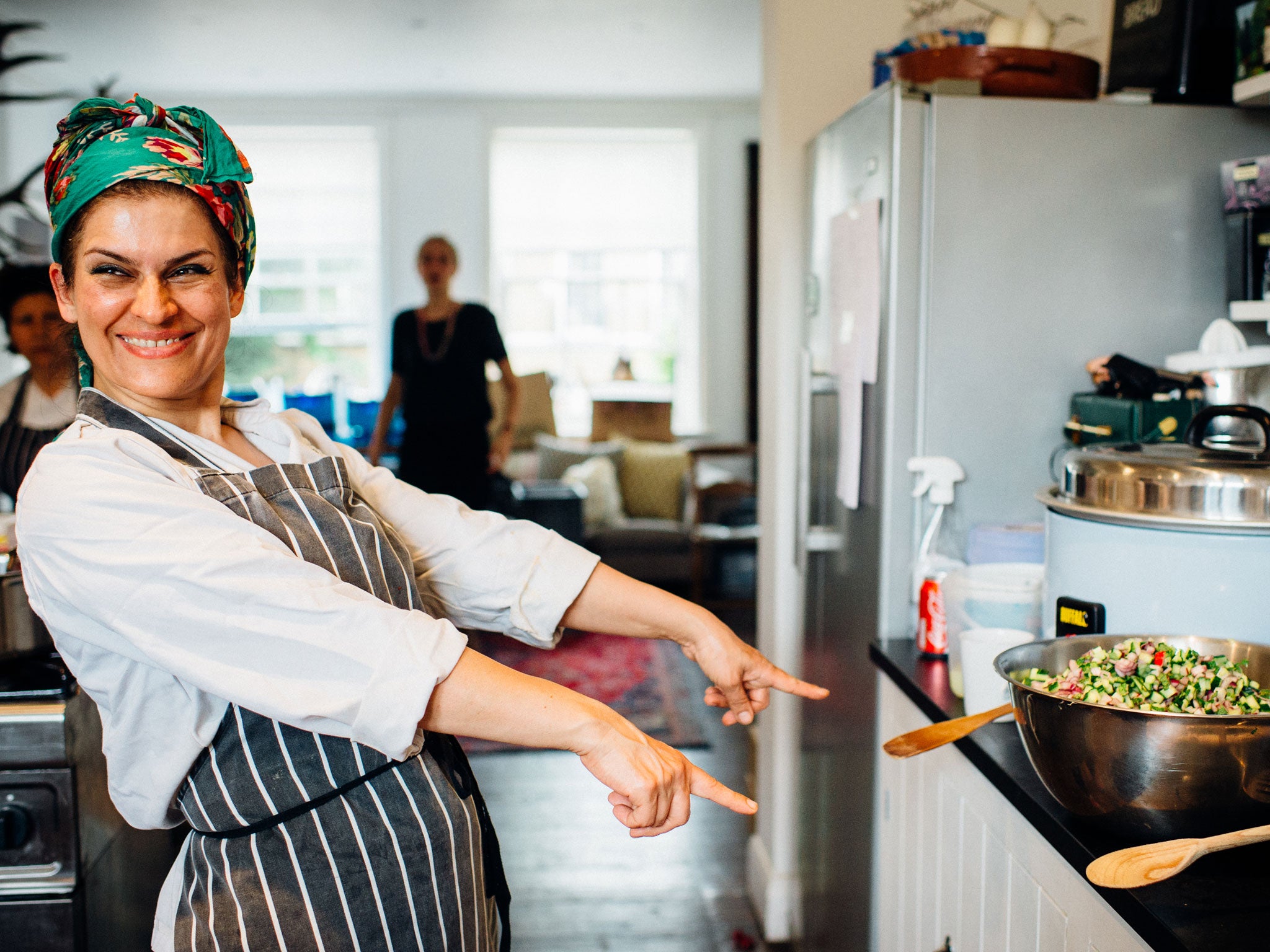
With Kopcke from the start was Mazi Mas kitchen manager Roberta Siao. Born In Rio de Janeiro, she learned to cook by watching her mother and grandmother in the kitchen.
Binding the public and private spheres releases women from loneliness, and gives them a space to share their experiences. Before Mazi Mas, one chef told Kopcke she simply felt invisible.
“It brings our humanity to the forefront and it is inspiring to see how much more we have in common than not” says Sioa, 44.
“Mazi Mas gives women much-deserved opportunity to be valued, earn their own money and many times, as we say in Brazil ‘be the owner of her own nose’!"
Recipes
Marlith’s ceviche
Serves four
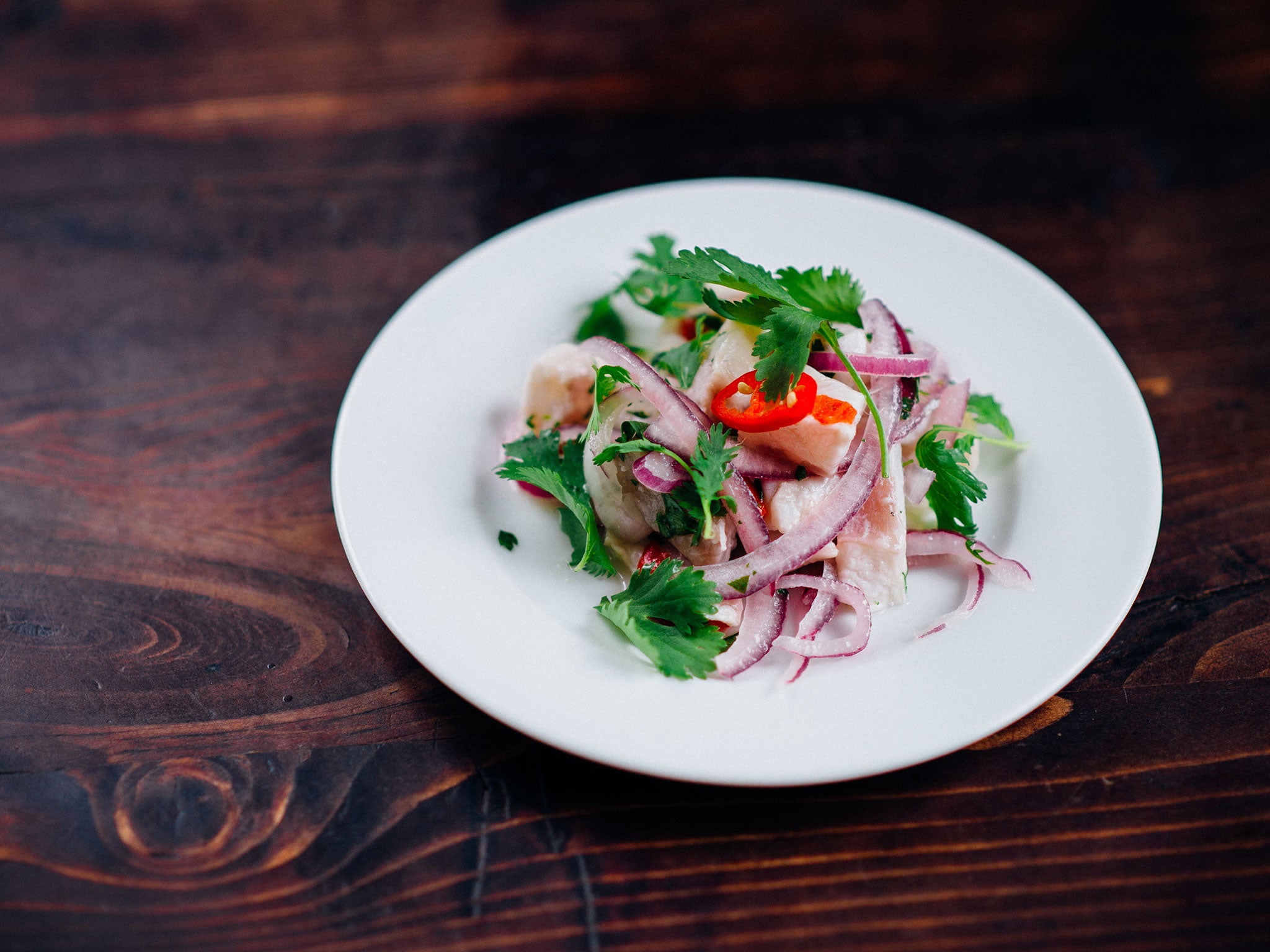
Marlith’s traditional Peruvian ceviche has become one of our favourite dishes at Mazí Mas. It is super simple to prepare, yet a real showstopper – and irresistibly delicious. We love the interplay of vivid colours, textures, and flavours in this dish. Summer on a plate!
Ingredients
500 g skinless and boneless sea bass or sea bream
8-9 limes
2-3 cloves garlic
2 red onions
1 bunch of fresh coriander
Red and green fresh chillies, one each (more if you like heat)
2 large sweet potatoes
4 large lettuce leaves
Half a bag of frozen choclo peruano, Peruvian giant corn
Half a bag of maiz cancha, Peruvian corn nuts
Method
Prep your fish: wash with cold water, pat dry, and cut in 2 cm cubes. Set in a bowl in the fridge while you prep the rest of your ingredients.
Set the sweet potatoes on to boil. You want to boil them in their skins until a fork easily pierces them, about twenty minutes to half an hour, depending on size. Once they are ready, run them under cold water until they are cool enough to handle. Carefully peel them – this cannot be done perfectly, so don’t worry if bits come off with the skin – and slice them into 1 cm thick rounds. Set aside.
While the potatoes are cooking, squeeze the limes into a large bowl. Pick the coriander fronds off the stalks and reserve.
Finely mince the garlic. Slice the chillis and red onions crosswise into fine rounds (if you don’t like heat, seed the chillis first). Add the garlic and chillis to the lime juice and season with salt. Put the onions in a separate small bowl of cold water to draw out any bitterness.
Using a deep fat fryer, or a small saucepan filled with vegetable oil to a depth of about 3 cm, fry the maiz cancha in batches until golden brown. Drain on kitchen towel and sprinkle with salt.
Boil the choclo peruano for 5 minutes and drain; set aside.
Take the fish out of the fridge and add it to the bowl of lime juice, along with the sliced onions.
How long you leave the fish in the lime juice depends on how “cooked” you like your ceviche. 20 minutes will cook the fish quite thoroughly; if you prefer it raw, let it sit no more than five.
Assemble the ceviche: place a lettuce leaf on each plate and arrange two slices of sweet potato on the side. Add a spoonful each of choclo peruano and maiz cancha. Spoon the ceviche in the middle of the leaf and top with a shower of red onions and coriander.
Zohreh Shahrabi's Kashke Bademjan (Iranian aubergine dip)
Serves two
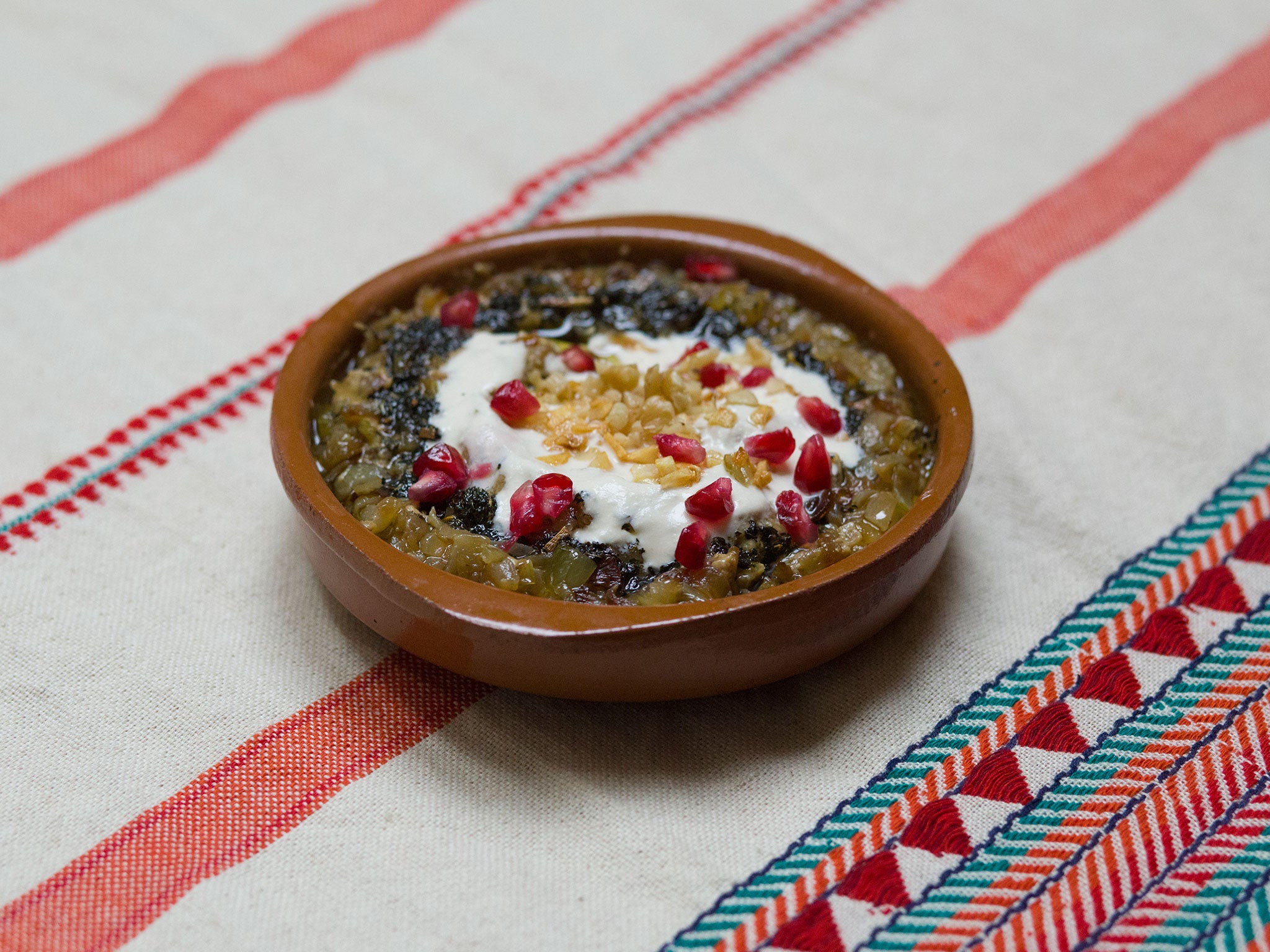
Kashke bademjan is one of the most popular dishes we serve. Artfully garnished by Zohreh in the traditional Iranian way, it is also one of the most beautiful. Kashk, a fermented yogurt used throughout the Middle East, lends the dish a distinctive, gentle sourness; it’s worth the effort to track it down, but you can also substitute sour cream. Kashke bademjan is wonderful as part of a mezze spread, served with Turkish bread or a good sourdough.
Ingredients
2 aubergines
Extra-virgin olive oil
1 tsp turmeric
1 onion, thinly sliced
½ cup Kashk
¼ cup coarsely chopped walnuts
1 tbsp dried mint
Salt and pepper to taste
Pomegranate (optional, for garnish)
Method
Peel and slice the aubergines into thick circles and fry in olive oil until golden on both sides. (Aubergine needs plenty of oil – make sure you use enough to saturate them.)
Remove from pan and let drain on kitchen towel.
Chop the onion and sauté in olive oil, stirring occasionally until golden.
Add the teaspoon of turmeric, then add the aubergines, kashk (reserve one tablespoon for garnish) and a couple tablespoons of water.
Heat the mixture over low heat until the aubergines are soft, then remove from heat and mash with a potato masher.
To serve, drizzle with a tablespoon of kashk and sprinkle over dried mint, chopped walnuts and sweet sautéed onion. Scatter a scant handful of pomegranate seeds on top, if desired.
Serve warm or at room temperature with bread or crackers.
Azeb Woldemichael's Ethiopian Kay Wat Beef and Potato Stew with Berbere
Serves six
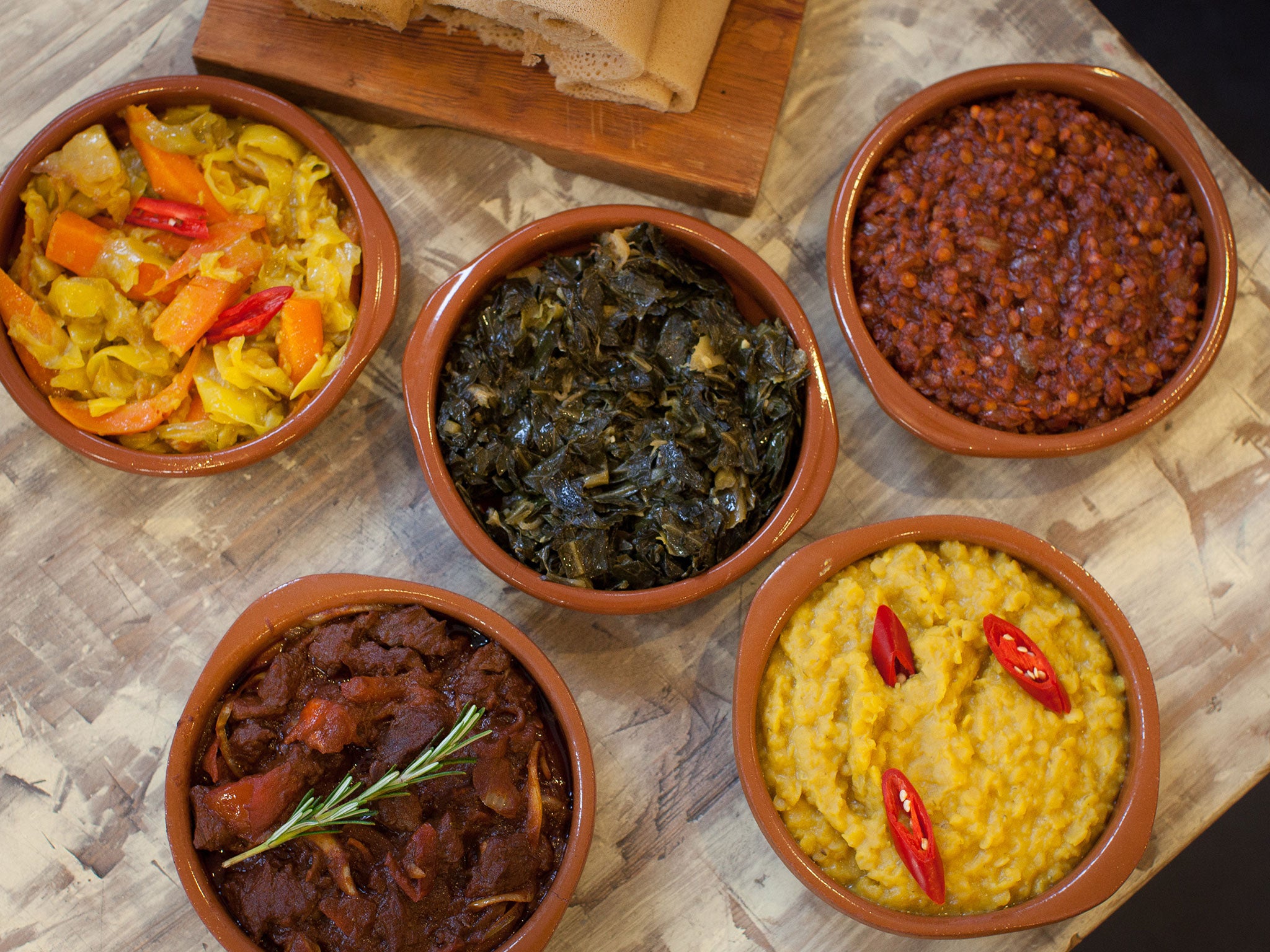
Azeb’s wonderful Ethiopian stews rely on a long, slow cooking process to draw out and deepen flavours. This dish requires some tending – it’s not one you can clap a lid on and forget about - but patience is amply rewarded: the flavours in Azeb’s kay wat are some of the richest and most complex we have ever tasted. Fiery berbere is Ethiopia’s signature chilli-and-spice mixture, and once it is in your cupboard you will wonder how you ever did without it. See the footnote for where to find it in London.
Ingredients
500 g diced lean beef
3 large potatoes
4 yellow onions
Half a head of garlic
4 tbsp extra virgin olive oil
2-3 tbsp berbere
1 tube tomato purée
½ tsp makelesha* (mix of ground Ethiopian spices) or cumin
Knob of butter
Salt
Method
Wash, peel and cut each potato in 7 or 8 irregular chunks; set aside.
Mince garlic and set aside. Finely dice the onion and sauté in olive oil over medium heat.
Once the onions start to brown, add the berbere, stir well, and add the tomato purée. Add a cup of water, stir, and simmer for 10 minutes.
Add the meat and cook until it has absorbed all the water in the pan. Add another ½ cup of water and let it absorb that too.
Add the potatoes, stir, and simmer gently until the potatoes are about half-cooked.
Add the garlic and another ½ cup water, and simmer until the sauce has thickened again. Add the makelesha or cumin and butter, season with salt, and simmer a final 10 minutes to allow all the flavours to meld.
Join our commenting forum
Join thought-provoking conversations, follow other Independent readers and see their replies
Comments